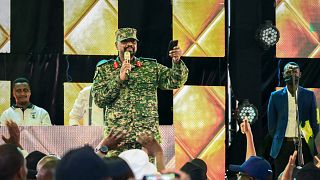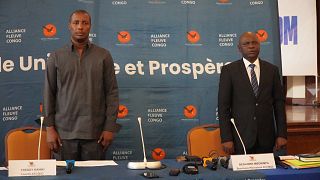Democratic Republic Of Congo
Congo’s ruling coalition recently launched what it called an “election centre” aimed at providing logistical support and sensitising the people ahead of polls scheduled to take place by the end of 2017.
After weeks of wrangling and false starts, Congo’s opposition leaders signed a deal on new year’s eve (December 31) with the party of President Joseph Kabila in Kinshasa that will require the president to step down after elections that must happen before the end of 2017.
But the election centre could widen the rift of mistrust between the ruling coalition and opposition parties who say it will be used to interfere with the electoral process.
The ruling coalition insists that the aim of the centre is to educate the Congolese people on the upcoming elections and offer other technical support to all parties during campaigns.
“The electoral center is not meant to interfere with the running of the electoral process, but rather it Is a supporting tool that aims to give technical, organisational, financial support as well as help other political parties during campaigns,” said Aubin Minaku, Secretary General of the ruling coalition.
Opposition members are warning against any distraction from the main focus of the deal, which is to hold elections this year.
“We have a deadline, which is December 2017 and the Congolese people will not allow for another “glissement” (sliding) of the electoral calendar again, so we have to be honest with them and stick to the agreement, we need a new government in place,” said a member of the Union for the Congolese Nation (UNC) party, Juvenale Munubo.
Despite the deal between the ruling coalition and opposition parties, huge hurdles remain.
The electoral commission has said elections may not be possible before 2018, and many doubt Kabila really intends to stand down.
Several of his supporters have floated the idea of changing the constitution to enable him to run for another term, as other African leaders have done.
Any failure to implement the deal would worsen instability that has seen scores of people killed over the past four months, many of them protesters shot dead by security forces. The police and military killed around 40 people last week protesting when Kabila’s mandate ran out on December 20.
On the streets of the capital Kinshasa, many share the opposition’s scepticism and question the need for a political party to have its own election center.
“When it comes to the election center, I can say that most Congolese people do not understand why a political party needs to have an electoral centre. It’s good to be innovative but we have to make sure that we do not confuse an electoral centre of a political movement to a national election center, which would be set up by the CENI (independent electoral commission). They shouldn’t confuse us,” said one Kinshasa resident, Joe Kinendia.
“When I first heard about it, I was happy, but I was intrigued with something because 11 months before elections are scheduled to take place as agreed in the political accord of December 31 mediated by CENCO, we still don’t know who the presidential candidate will be for the ruling coalition,” said another Kinshasa resident, Walter Nkuyi.
Rael Muntaloa is a political journalist based in Kinshasa.
“In my opinion, the launch of election centre by the ruling coalition has a main objective of preserving power, the ruling coalition has realised that elections are inevitable, they will take place in the near future and they are preparing for that day. So the launch of the election centre is a way for the ruling party to prepare to go to battle, in order to be better prepared to face the electoral challenges that lie ahead, which have already proven to be quite significant,” he said.
Analysts also warn that major political, financial, technical and logistical support to Congo is needed for the elections to take place by December 2017.
Diplomats feared growing unrest could trigger a repeat of the wars that killed millions, unleashed scores of predatory armed groups and drew in more than half a dozen neighbouring armies between 1996 and 2003.













01:08
Dancehall superstar Shatta Wale urges young people to back President Mahama
01:00
Pix of the Day: July 3, 2025
01:09
Guinea presents draft for new constitution, referendum set for September
01:08
DRC extends ban on cobalt export for another three months
01:07
WHO says the mpox outbreak remains a public health concern
01:05
DRC authorities ban media reporting on ex-president Kabila, party